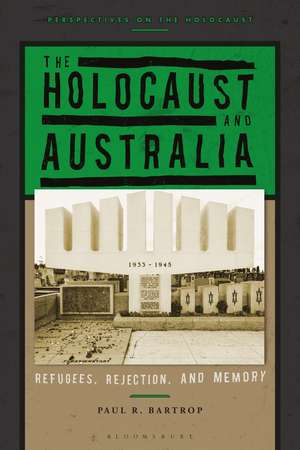The Holocaust and Australia: Refugees, Rejection, and Memory: Perspectives on the Holocaust
Autor Professor Paul R. Bartropen Limba Engleză Paperback – 24 aug 2022
| Toate formatele și edițiile | Preț | Express |
|---|---|---|
| Paperback (1) | 135.54 lei 3-5 săpt. | +27.61 lei 6-10 zile |
| Bloomsbury Publishing – 24 aug 2022 | 135.54 lei 3-5 săpt. | +27.61 lei 6-10 zile |
| Hardback (1) | 408.85 lei 6-8 săpt. | +51.54 lei 6-10 zile |
| Bloomsbury Publishing – 24 aug 2022 | 408.85 lei 6-8 săpt. | +51.54 lei 6-10 zile |
Preț: 135.54 lei
Preț vechi: 145.96 lei
-7% Nou
Puncte Express: 203
Preț estimativ în valută:
25.94€ • 28.26$ • 21.85£
25.94€ • 28.26$ • 21.85£
Carte disponibilă
Livrare economică 02-16 aprilie
Livrare express 18-22 martie pentru 37.60 lei
Preluare comenzi: 021 569.72.76
Specificații
ISBN-13: 9781350185135
ISBN-10: 1350185132
Pagini: 296
Ilustrații: 20 bw illus
Dimensiuni: 156 x 234 x 23 mm
Greutate: 0.42 kg
Editura: Bloomsbury Publishing
Colecția Bloomsbury Academic
Seria Perspectives on the Holocaust
Locul publicării:London, United Kingdom
ISBN-10: 1350185132
Pagini: 296
Ilustrații: 20 bw illus
Dimensiuni: 156 x 234 x 23 mm
Greutate: 0.42 kg
Editura: Bloomsbury Publishing
Colecția Bloomsbury Academic
Seria Perspectives on the Holocaust
Locul publicării:London, United Kingdom
Caracteristici
The most authoritative history of Australia's response to the Holocaust and how it has been and is remembered in existence
Notă biografică
Paul R. Bartrop is Professor Emeritus at Florida Gulf Coast University, USA. He is the author and co-author of several books, including Resisting the Holocaust: Upstanders, Partisans, and Survivors (2016), Encountering Genocide: Personal Accounts from Victims, Perpetrators, and Witnesses (2014) and Genocide: The Basics (2014). He is also the co-editor, along with Samuel Totten, of The Genocide Studies Reader (2009) and the four-volume Modern Genocide: The Definitive Resource and Document Collection (2014; co-edited with Steven Leonard Jacobs).Professor Bartrop is currently Vice-President of the Midwest Jewish Studies Association, and is a Past President of the Australian Association of Jewish Studies.
Cuprins
AbbreviationsDramatis PersonaeIntroduction1. Australians, Jews, and a Hostile World2. Confronting the Refugee Challenge3. Developing a Response4. Australia and the Evian Conference5. Holding the Line6. Public Opinion and Policy Options7. Liberalisation?8. Total Restriction9. The Last Days of Peace10. Responses to Jewish Refugees11. Refugees and Enemy Aliens12. Wartime Europe and Australia13. News about the Holocaust14. Australians View the Nuremberg Trial15. Aftermath: The Hunt for Nazi War Criminals16. Memory: The Holocaust and its Place in Australian HistoryBibliographyIndex
Recenzii
The scholarship of Paul Bartop, one of the most prolific of Genocide and Holocaust scholars, never ceases to provide insight into often underexamined dimensions of the Holocaust. In The Holocaust and Australia, Bartrop continues that tradition by shifting his lens from Europe to Australia and powerfully succeeds in illustrating the ways in which the Nazi persecution of the Jews had worldwide implications and consequences. I highly recommend this book as an essential read for anyone interested understanding the ways in which the Holocaust was a global calamity the consequences of which continue to influence and haunt our world today.
In this vital book, Paul R. Bartrop expertly takes us from the opening threats of the Nazi regime, through the genocide, to the Holocaust's aftermath in courts and memories, carefully outlining Australia's response. He skilfully sets out the reasons why Australia rejected Jewish refugees, showing the behind-the-scenes discussions and machinations of government. We read devastating stories of what Australia's lack of action meant for the lives and futures of so many Jews. Traversing the records of government bureaucracy, media coverage, and the letters that Jews wrote begging for assistance, Bartrop reminds us of the ways that Australian governments have historically closed their borders, refusing to offer protection to people desperately in need. It's a timely reminder of a long history in this country, and Bartrop shows clearly the importance of his meticulous historical work for illuminating this past. This is a book which we all need to read, to remember the dangers of governments 'selecting' who their populations will be.
In this vital book, Paul R. Bartrop expertly takes us from the opening threats of the Nazi regime, through the genocide, to the Holocaust's aftermath in courts and memories, carefully outlining Australia's response. He skilfully sets out the reasons why Australia rejected Jewish refugees, showing the behind-the-scenes discussions and machinations of government. We read devastating stories of what Australia's lack of action meant for the lives and futures of so many Jews. Traversing the records of government bureaucracy, media coverage, and the letters that Jews wrote begging for assistance, Bartrop reminds us of the ways that Australian governments have historically closed their borders, refusing to offer protection to people desperately in need. It's a timely reminder of a long history in this country, and Bartrop shows clearly the importance of his meticulous historical work for illuminating this past. This is a book which we all need to read, to remember the dangers of governments 'selecting' who their populations will be.









